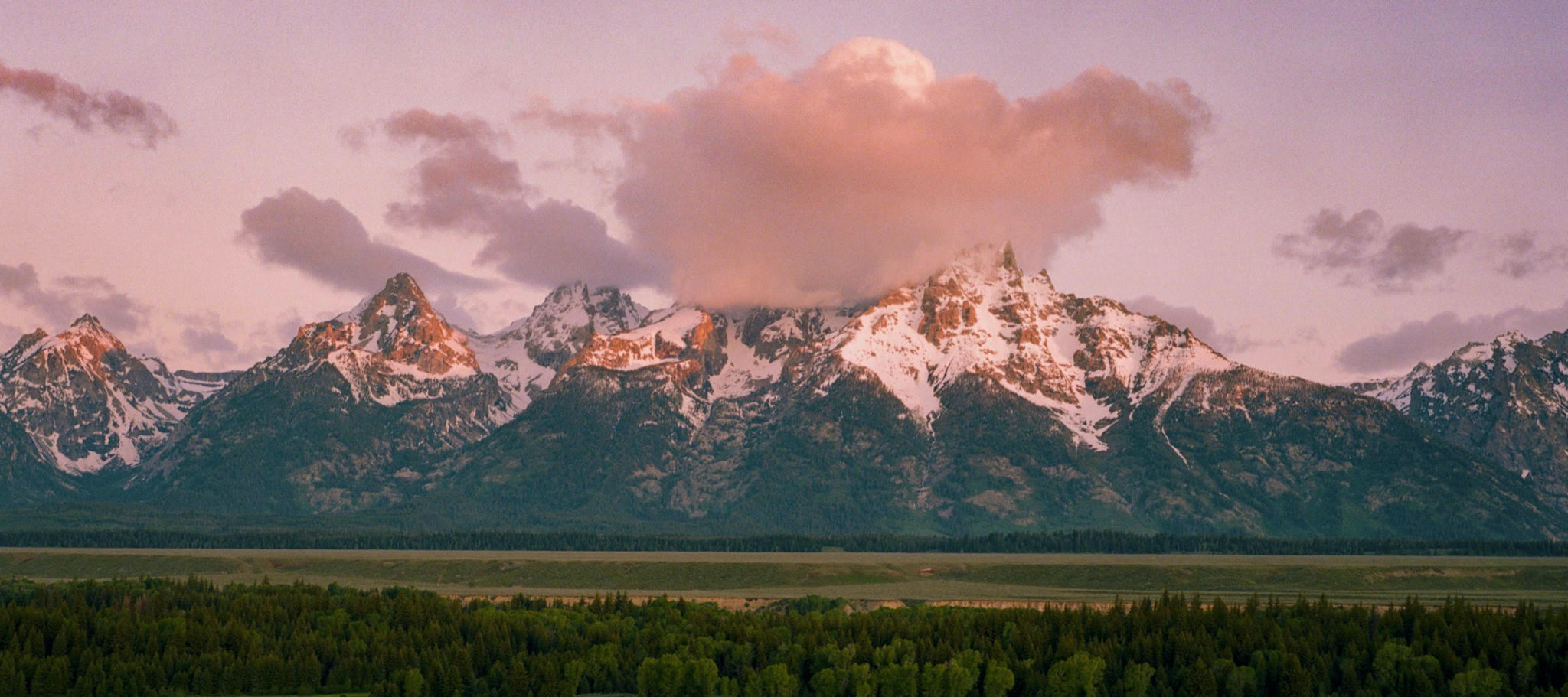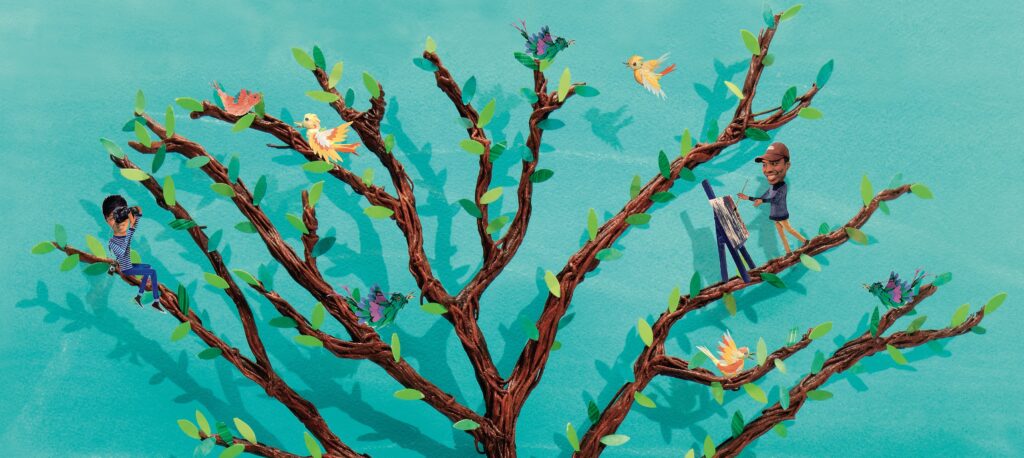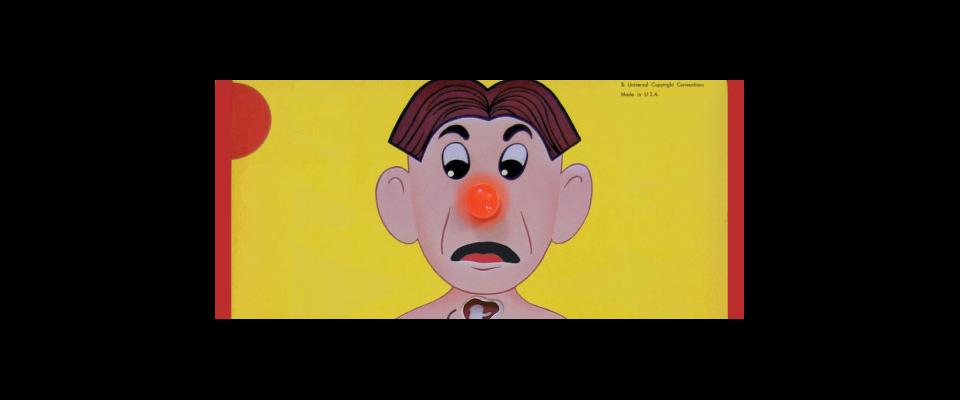What Dacher Keltner teaches isn’t likely to land you a job on Wall Street or even make you more hireable, but that’s not really the point. Rather, it’s “a philosophy of life,” or an opportunity to grapple with one of the oldest and most important questions: “How can we live the good life? One enlivened by joy and community and meaning, that brings us a sense of worth and belonging and strengthens people and natural environments around us?”
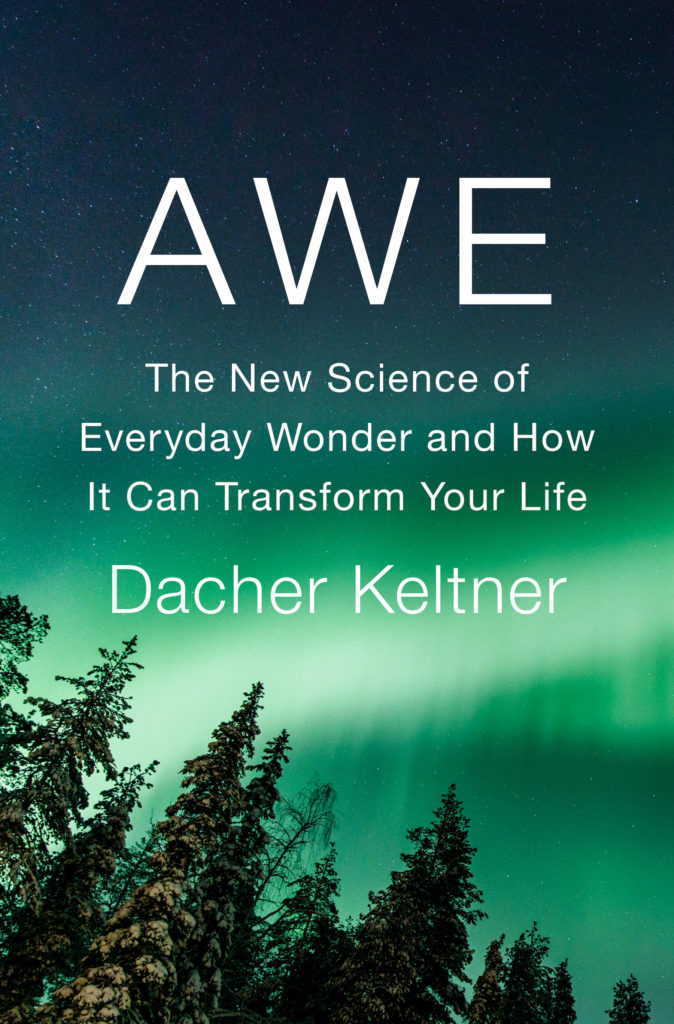
As faculty director of the Greater Good Science Center, a psychology professor at UC Berkeley, and host of the popular Science of Happiness podcast, Keltner has made a career of studying and teaching positive emotion. But after the death of his brother Rolf Keltner (‘89) in 2019 from cancer, he turned his attention to a tricker human emotion: Awe. Keltner defines awe as “the emotion we experience when we encounter vast mysteries that we don’t understand.”
In his new book, Awe: The New Science of Everyday Wonder and How It Can Transform Your Life, Keltner explains that we experience awe in response to the “eight wonders of life”: “the strength, courage, and kindness of others; collective movement in actions like dance and sports; nature; music; art and visual design; mystical encounters; encountering life and death; and big ideas or epiphanies.” While he explains how he and his colleagues have measured our encounters with mysteries we don’t understand in lab settings, the most compelling parts of the book are the stories of real people’s lived experiences. Take the war veteran with PTSD, whose rock climbing epiphany led him to a life helping others, or Keltner’s own experience watching his brother die. In one shocking and less grand instance, someone even finds awe at work. “We can find awe anywhere,” Keltner writes. “A couple of minutes a day will do.”
California magazine sat down with Keltner to discuss the value of painful experiences, psychedelics, the awe-killers dogging us today, and how we can get out of there and get some awe for ourselves.
This interview has been edited for length and clarity.
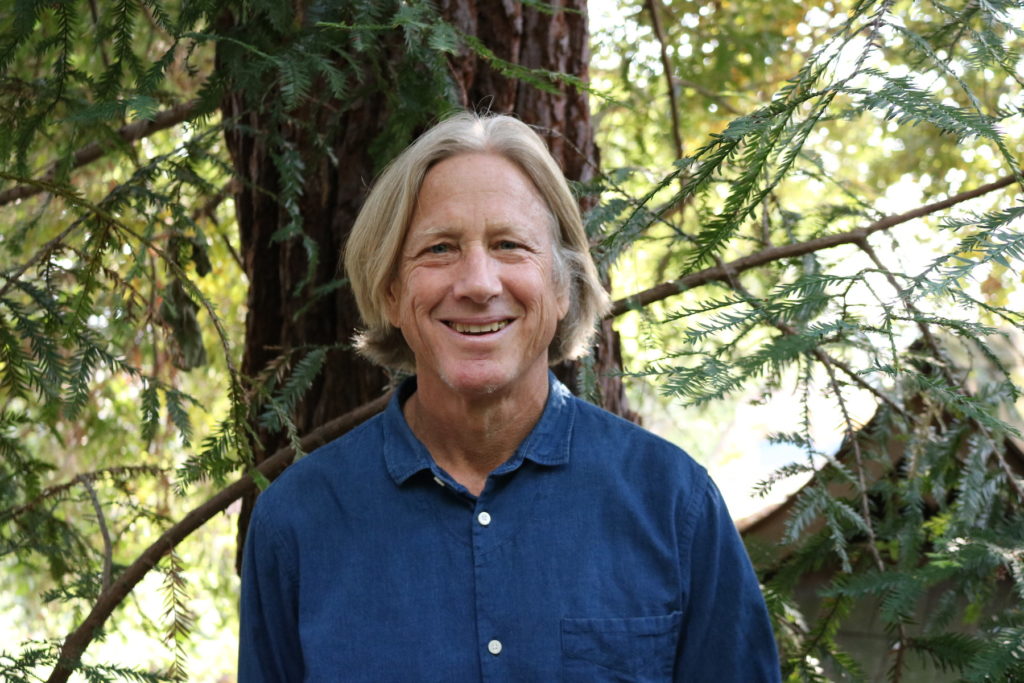
You’re known for your happiness class, but awe is different. There’s often a painful element to it. It’s not a hunky dory experience.
Not at all, and I think that that’s really important. Most experiences of awe today, about three quarters are positive. “This feels good, I feel energized, I want to make the world better.” But there is in awe an underlying anxiety or uncertainty. “I don’t know how to make sense of this.” And then very often awe arises in really hard circumstances. Some of our best emotions arise in response to hard things, [such as] compassion, which most people believe is the most important human emotion. It’s when we see people suffer [that we want to help]. So [awe] does have hard things in it. It’s uncertain, it’s often destabilizing. When my brother died, I was like, “how do I make sense of life anymore?” He was who I leaned on.
And much of this book came out of that experience. Does it make you want to be more of an advocate for hard experiences? We live in a very comfort-oriented society…
I think as you get older, you start to realize that the really meaningful stuff in life comes out of hardship. A hard time in my teens, a hard time at work, watching my brother dying–that changed my life. The storms are really the source of insight. The first Noble Truth of Buddhism: life involves suffering, death, disease and dying. I had a long period studying compassion. Compassion is all about suffering. Our most noble tendencies come out of that. I feel like a subtext of the book is: go after mystery. If you are facing trauma, engage, like I did with grief, which was so painful. Listen, your body and your mind, and the awe that it is finding.
In the book you talk a lot about these big experiences like your brother dying. There’s a long section on birth. These are major transformative events. But you also talk about ordinary awe which sounds like a contradiction. How could awe be ordinary? Or daily?
[A] big finding that really caught us off guard was the everyday or the ordinary awe. You ask people “what is awe” [they say], “Oh, it’s, it’s when I bungee jumped out of the tallest tree in Humboldt County,” or “I hugged Madonna.” They give you these once in a lifetime stories. We had people in different countries tell us if [they] felt awe today, after two weeks, and they [reported that] about two to three times a week, they were feeling some little piece of awe, and the descriptions were so moving. “In a park in Beijing, this leaf falling and following the trail of the leaf and what it taught me about life,” [or] “I remember walking by a park and hearing kids laugh and play, and it sounded like my childhood.” [Or] “I remember a friend just coming by and helping me out when I was really broken.” There’s a lot of awe around us to be appreciated.
How do you recommend people pursue awe in their daily lives?
I teach human happiness to tens of thousands of people: medical doctors, judges, Berkeley students, online, everywhere. And, especially post pandemic, almost every time I teach it, somebody will come to me and say, “I’m depressed or my son is depressed and suicidal.” And, they’re like, “What do we do?” And I say, “Get them outside and go look for awe.” We know awe reduces stress. Awe helps your immune system. We know awe makes you feel like you have more time. It makes you feel like you’re part of a community. I can walk across the Berkeley campus, be awestruck by the trees and I’m suddenly like, I have a great community, my colleagues are great. If you find a minute or two out of your day, go out to lunch, go watch a cloud for a minute, just see how it changes. You’re heading towards good news. And, man, do we need that right now.
What kills awe or prevents us from experiencing it?
It’s the best and worst of times for awe. I look at the music that people share. My younger daughter, Serafina, shares music with me. In one millisecond, I’m suddenly listening to a universe. My older daughter, Natalie, shares visual art with me. But you know, there are obvious culprits that are harming the capacity for wonder in our young people. The smartphone is designed to take out mystery, to take out wonder, to take out curiosity.
Also, economic inequality, racism, mass incarceration, this cultural mix right now in the United States. It has people agitated and that undermines our awe.
That seems intuitive, but can you explain how those things kill awe?
We don’t know a lot about awe killers, empirically. But awe, by its very definition, requires openness. A nonjudgmental approach to mystery. And humility. And, you know, racism amplifies this “us/them” and activates all the stereotypes that countervail the openness we need for awe. And then there’s something about privilege, wealth, commodification that is a process that undermines our openness to awe.
What about wealth undermines awe? You’d think having lots of money would remove obstacles to life’s experiences.
Privilege brings a heightened sense of self agency. “I’m in charge of everything. I’m the master of everything.” It brings a sense of the lack of hardship, and a lack of mystery. We don’t have data on this, but I think that there’s this privileging of sensory pleasure [among the wealthy]. Fine foods and wines, and you know, the hammock at the resort or whatever. And [with] awe you’ve got to get a little raw, you’ve got to get dirty, out in the woods. You’ve got to be around people really showing strength and courage.
What about for students? Do you notice anything besides our wonder-killer phones that are undermining awe for young people today?
This will be very familiar to your parents: our students are way too test-focused. The minute I give a test, I get a million questions about “What’s the curve? What’s the score?” Our students need more time to wonder and wander and then get back to some of the philosophy of life type class, where it’s more open-ended. I teach Human Happiness at Berkeley, and one of the things I said at the start is like what I really want you to do in this class is think about your philosophy of life. What is meaningful to you?
Changing tracks a little, psychedelics are in the news a lot lately. You’re part of the leadership of the UC Berkeley Center for the Science of Psychedelics. What role do psychedelics have to play in awe?
Awe is one of the key ingredients of psychedelics. I think it’s good news for a lot of people on balance. The U.S. and Western Europe tend to have a kind of interventionist, “get it in one shot” approach though. There are a lot of worries I have about psychedelics.
Like what?
The exploitation of indigenous culture. Put that in bold font. And then [psychedelics are] one of many pathways. And the deeper lesson of the science of awe is [that] there are eight wonders of awe. And you can find [awe] in music to your dying day, you can find it in observing nature, you can find it in thinking about the miracle of how children learn language and grow and find it in big ideas. What we really need is: each person should figure out their profile of the eight wonders, and go get them. And we don’t want to trick ourselves into believing that one psychedelic trip or a six-session therapy is a replacement for the bigger challenge of figuring out the wonders of life and how you want to go after them.
Does talking about awe all the time make it less awesome? Or is awe a regenerative resource?
It’s regenerative. Thank you for that word. We’ve done research; if you practice awe, it gets deeper and richer. I find national parks awe-inspiring. The more I go to them, the deeper it gets. When I heard all these stories, I just had to put them in the book because they gave me awe. We have long traditions, old traditions of writing about awe: spiritual journaling, psychedelic journaling, musical writing, nature writing. We don’t have data on this but, I’d love to study how contagious awe is. You hear somebody talking about the experience of awe: “I was just holding my sister’s hand and she passed away and thinking about the divine sisterhood we had,” and you’re just like, “I’m tearing up, man. I can’t believe I’m getting chills.” So that tells us, contrary to a lot of domains like talking about my latest trip to the resort. Not inspiring. Not contagious. Isn’t that interesting? “Let me tell you about this amazing retreat I went on” and you’re like, “Oh, God,” [versus] “Let me tell you about this amazing art experience.” So we need to talk about awe more.











